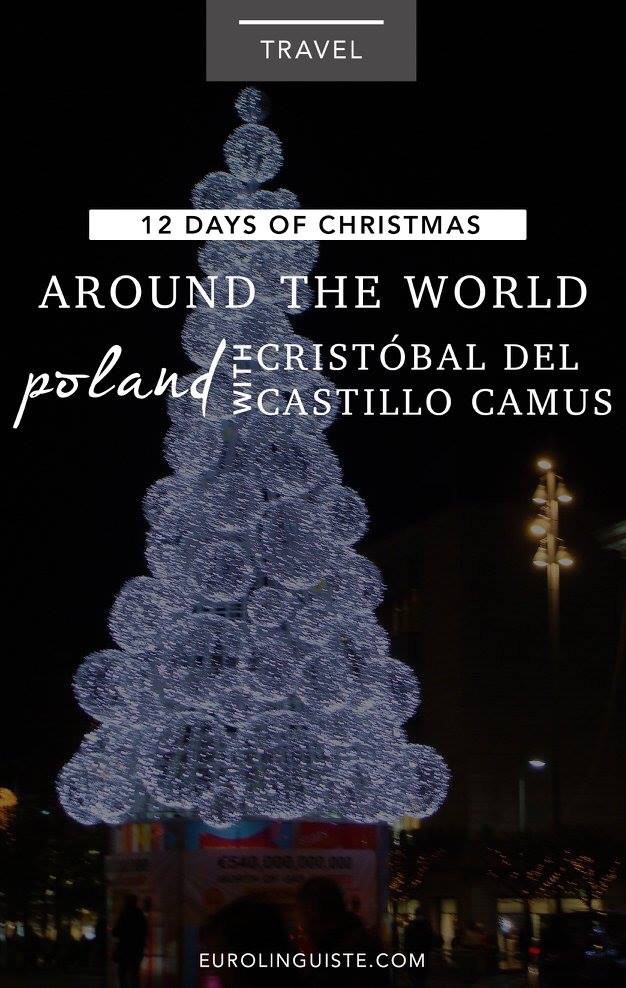Christmas in Poland | 12 Days of Christmas Around the World Day 1

My name is Shannon Kennedy and I'm the language lover,…
About the Author // Cristóbal del Castillo Camus an avid language learner from Santiago, Chile. He speaks Spanish, English, French, German, Italian and Polish. You can learn more about him and read posts that he has written here.
Christmas in Poland – Boże Narodzenie w Polsce
Christmas time in Poland is very special. It is indeed a celebration in which families come together, many children (or people with children spirits) enjoy and also it gives a short time to rest.
Christmas season in Poland start on December 6th with Mikołajki, or St Nicholas’ day (Św. Mikołaj). In that morning, you get small presents from St Nicholas, since the big ones come during Christmas Eve. Make sure you clean your shoes the night before!
Christmas Eve is a special day in Poland and most traditions are still well alive in Poland. Most places close early since it is a special date to spend it with the family or close relatives. During that day, people are supposed to fast (not much of a problem since the sunset is really early) and when the first star is seen, Wigilia starts.
Wigilia is the actual Christmas Eve dinner. There are about 12 dishes available in that dinner. Yes, 12. And there is always an extra seat for unexpected guests, visitors or someone who might spend this holiday alone. The first thing people do before eating is to break Christmas-themed wafers called opłatki and exchange good wishes for the holiday season. Then the 12 dishes start to appear: barszcz (beetroot soup) with dumplings, mushroom soup, carp, herrings, pierogi (dumplings), sauerkraut, cabbage rolls or gołąbki, kutia (dried fruit dessert), gingerbread or piernik (best eaten in Toruń), compote and poppy seed cake (makowiec). As you may see, all of those dishes have no red meat and can be totally vegetarian or vegan friendly, if you wish to.
After enjoying all of these hearty dishes, children get a visit from… either Father Christmas himself, Gwiadzor (Starman) or Anioł (an angel), depending on the family’s tradition. Many people in Poland often go to church at midnight for the Shepherd’s mass (pasterka) where Christmas carols (Kolędy) or people turn on the television to watch a Christmas classic in Poland: Kevin sam w domu or Home Alone.
During Christmas Day, most Poles visit relatives and eat leftovers from the Wigilia. They also get Dec 26th off and most students do not go to school until the end of year holiday season is over.
The Christmas Tree along with the Nativity Scene are taken off the houses on January 6th, when the 3 Wise Kings visited Jesus.
Słonictwo // Vocabulary
| English | Polish |
| Have a Merry Christmas! | Wesołych Świąt Bożego Narodzenia! |
| Christmas Eve dinner | Wigilia |
| Christmas | Boże Narodzenie |
| Saint Nicholas’ Day | Mikołajki |
| Star | Gwiadza |
| Christmas wafer | opłatek |
| Cheers! | Na zdrowie! |
| Yummy! | Pycha! |
| Dish | Danie |
| Soup | Zupa |
| Vegetarian/Vegan dishes | Wegetariańskie / Wegańskie dania. |
| Dessert | deser |
| Christmas Eve dinner leftovers | Resztki z Wigilii |
| Mushrooms | Grzyby |
| Gifts | Prezenty |
| Christmas letter | List do Mikołaja |
| Children | Dzieci |
| Dinner | Kolacja |
| School vacation | Wakacja |
| Toy | Zabawka |
| Shoes | Buty |
| Christmas carol | Kolęda |
| Television set | Telewizor |
| Guest | Gość |
A Holiday Dish Prepared in Poland

PIEROGI RUSKIE / RUTHENIAN PIEROGI
Notes
300g of wheat flour
a dash of salt
125ml of warm water
1 egg
20g of butter For the Filling:
500g of farmer’s white cheese (if you cannot found it in your local shop, there are recipes online to do it)
500g of potatoes
1 small onion
2 teaspoons of oil
½ teaspoon of ground black pepper. Instructions for the dough:
Sift the flour into a bowl and add the salt. On a separate bowl, put the butter and warm water, and after the butter has melted, add it to the flour, and mix it with a spoon. Add the egg later and combine them until you get a smooth dough. Knead the dough for about 7-8 minutes and then wrap it in foil and let the dough rest for 30 minutes. After that, divide the dough in 4 parts and try to get a thin dough that makes you able to work with without breaking the pierogi. Use a small glass to create the circles, and then you add the filling. Instructions for the filling:
Peel the potatoes, rinse them, add them to a pot with water and boil them until they are tender. Drain them, and when it’s still hot, smash them, until they have no lumps. When they have cooled down, crumble the cheese and mash it with a fork. Stir the mix with the potatoes, add salt and pepper. Cut the onions in cubes, and put them to fry in a pan with either butter or oil. Add them later to the mix. Cooking pierogi:
Add one tablespoon of the mix to the dough and then fold the pieróg in half and seal them carefully. You can do that in a countertop with flour below and when they are ready, cover them with a tablecloth so they don’t dry.
In a large pot, boil salted water with a tablespoon of oil or butter and put the first batch of pierogi (about 15 will do) after the water boils. After they reboil, reduced the heat to medium-low until they rise to the surface and leave them for 1,5 minutes. The pierogi ruskie will be ready by that time.
SMACZNEGO! MAY YOU ENJOY THEM!
Would you like to download a copy of this recipe and vocabulary? Enter your email below and I’ll send you the password and link to the page on this site where all 12 of the recipes and vocabulary sheets will be posted!

What's Your Reaction?
My name is Shannon Kennedy and I'm the language lover, traveler, and foodie behind Eurolinguiste. I'm also the Resident Polyglot at Drops and the Head Coach of the Fluent in 3 Months Challenge.



